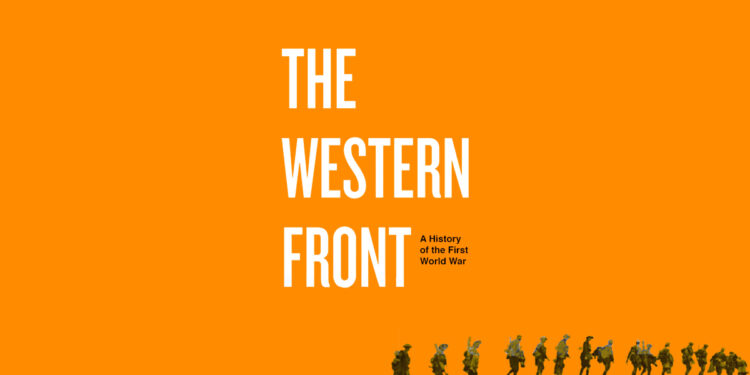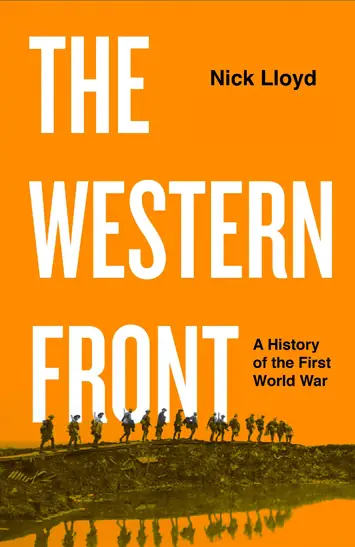The Western Front: A History of the First World War by Nick Lloyd – Review

By Jeff Halden
In Britain, the legend of the Western Front in World War I is deeply embedded in the national psyche. There were 764,000 British dead in the war to end all wars, with well over a million more wounded. Of those that were killed, 85% were lost in France and Belgium, on the Western Front. These losses affected virtually every family in the land in some way and have never been forgotten. They formed the main component of a story characterized as the futile sacrifice of ordinary soldiers by generals many miles behind the front line – ‘The Donkeys’, as portrayed in Alan Clark’s 1961 book of the same name. This book popularised the phrase ‘Lions led by Donkeys’ and became the prism through which the fighting on the Western Front was largely viewed in Britain.
Increasingly however, this prevailing orthodoxy has been challenged by historians who have attempted to present a more nuanced and empathetic view of the commanders on both sides who directed the war. Nick Lloyd’s book is the latest effort. The first in a projected trilogy (‘The Eastern Front’ follows in 2024, and ‘The Wider War’ in 2027), The Western Front recounts in detail what happened in France and Belgium between August 1914 and November 1918 from the perspective of the main combatants: France, Britain, Belgium, the United States and Germany. Lloyd’s thesis is that rather than the accepted narrative of ‘pointlessness and stupidity’, it should be presented as ‘an epic triumph against the odds’. Prospective readers should be aware that this is the war presented from the senior commanders’ point of view, the men who directed fighting on the Western Front at a strategic and operational level. They will search the index in vain for any mention of war poetry for instance, or the names Wilfred Owen, Siegfried Sassoon et al.
“Demolishing the distorted view”
 Nick Lloyd, Reader in Defence Studies at Kings College, London, is well qualified to offer a new perspective on an already well-known story. A noted historian of British history in the era of the Great War, he has written four previous books about this period. This book’s 500 pages of text, supported by over 150 pages of notes, bibliography and index, cogently retell the by-now familiar tale of a stalemate that lasted four years. However, the book’s focus on the generals’ war means that the personal horror of trench warfare, as experienced by the infantryman in the front line, rarely intrude on the descriptions of battlefield strategy. I would like to have seen more of the personal testimonies from those whose task it was to advance into no man’s land to carry out the orders handed down from headquarters.
Nick Lloyd, Reader in Defence Studies at Kings College, London, is well qualified to offer a new perspective on an already well-known story. A noted historian of British history in the era of the Great War, he has written four previous books about this period. This book’s 500 pages of text, supported by over 150 pages of notes, bibliography and index, cogently retell the by-now familiar tale of a stalemate that lasted four years. However, the book’s focus on the generals’ war means that the personal horror of trench warfare, as experienced by the infantryman in the front line, rarely intrude on the descriptions of battlefield strategy. I would like to have seen more of the personal testimonies from those whose task it was to advance into no man’s land to carry out the orders handed down from headquarters.
Also largely missing from this account is any attempt to set the conflict within its wider economic and social context, although the activities of the various Presidents and Prime Ministers are described in some detail. Particularly valuable are the insights into the French and German Governments’ conduct of the war. Military history enthusiasts will appreciate the detailed descriptions of the battles viewed from both sides of the lines, and how technological developments, particularly in the air, influenced the final outcome. The men and materials expended in this conflict were prodigious: the campaign on the Western Front left 1.5 million Germans dead with over 3 million wounded, and French war dead amounted to 1.4 million with over 4 million wounded. British dead added another three quarters of a million to this monstrous bloodletting.
By his focus on the decision making at the highest levels of the military machines, Nick Lloyd gives us a valuable picture of the pressures, responsibilities and complexities involved in directing the war. The interplay between the large number of characters and events is deftly handled and lucidly presented. For this reviewer, the book did achieve its undoubted aim of demolishing the distorted view of the generals as ‘Donkeys’ and in that respect was a refreshing change from what has been described as the ‘Black Adder’ view of the First World War. What I suggest it did not do was to give equal weight to the sacrifice and contribution of the ‘Lions’ to the final victory on the Western Front.
‘The Western Front: A History of the First World War’ by Nick Lloyd is published by Viking, £25 hardback









